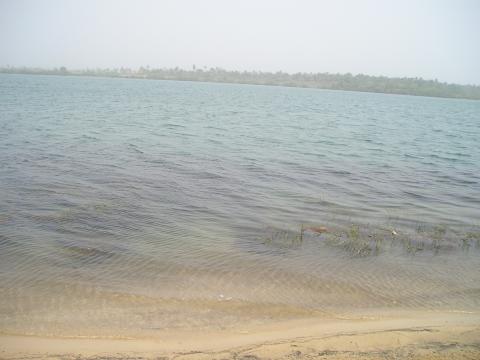Igboland: Landlocked or Sealocked – Same Difference By George C E Enyoazu

Photo by Innocent John Aghaeri Anozie: A view of Oguta Lake
I am indeed aware that diverse opinions on Biafra and Igboland exist. But the issue, and of course fear of being trapped in a landlocked country gets recurrent. In fact, many Igbo people who know very little about the political geography of their land have always acquiesced to the dubious falsification of the geography of Igboland by the architects of a more diminished and weakened Igboland. As for me, regardless of what the buzz word is, Nigeria has given us no better option than to seek an entity that accelerates our quest to be humans with dignity, hope and secured future. In fact, I am committed to ensuring the emergence of a place my children and their children will be proud to call home.
Needless to say, I was 5 years old in 1967 when it all began. I suffered Kwashiorkor (Harold Wilson's Syndrome), was flown to Sao Tome in 1968...
However, the point of a landlocked Biafra hardly worries me, although I do not believe that Biafra is gonna be landlocked. At worst, we will be content with the Azumini Blue Sea and Oguta as our sea corridors to the world. Besides, we will have inland ports, such as Onitsha/Asaba.
Having said these, it's a common fact that prosperity doesn't come to countries because they are surrounded by seas. If it were so, Nigeria wouldn't be lying prostrate, visionless and chronically underdeveloped. Access to the sea hasn't changed the economic fortunes of Nigeria. Nigeria is a failed State.
The Ijaw virtually live in water, but they are the most pitiable in underdevelopment, at least in Southern Nigeria. Their access to sea has meant nothing much in terms of better life.
Somalia has the longest coastal line in Africa, but irrespective of that, Somalia remains a failed State.
The sea hasn't given any economic advantage to the Caribbean Islands, such as Jamaica.
Haiti is the poorest country in the Northern hemisphere, in spite of being chiefly a country with great access to the sea.
Ireland has no land borders with any country. It was so poor until recently...the seas did nothing to lift Ireland out of poverty and hopelessness.
There are 15 landlocked countries in Africa, 15 in Europe, 12 in Asia, and 2 in South America. They include: Botswana, Rwanda, Burundi, Burkina Faso, Central African Republic, Chad, Ethiopia, Lesotho, Malawi, Mali, Niger, Swaziland, Uganda, Zambia, Zimbabwe; Luxembourg, Austria, Switzerland, Andorra, San Marino, Belarus, Czech Republic, Hungary, Liechtenstein, Moldova, Serbia, Slovakia, and Vatican City; Afghanistan, Bhutan, Laos, Nepal, Armenia, Azerbaijan, Kazakhstan, Kyrgyzstan, Mongolia, Tajikistan, Turkmenistan, Uzbekistan; Bolivia and Paraguay.
Obviously, we've seen numerous countries that are, although landlocked, but have prospered much more than the ones surrounded by water. Examples are: Switzerland, Austria, Luxembourg, Liechtenstein, Hungary, Czech Republic, Botswana, Rwanda, Uganda. Interestingly, Botswana has consistently been the most progressive country in Africa. Consequently, the argument of being a landlocked country does not outweigh the need and desire of self-determination with the overall hope of attaining substantiated progressive and thriving economy. Biafra holds the promise that we all crave, God willing. Ideas, vision and strategic planning rule the world. Whether landlocked or not, any country can rise above mediocrity and be true to itself and its citizens and make its mark in the comity of nations.
Finally, the Igbo Nation needs to prepare effectively for the rainy day. As things are, Nigeria has no promise of being eternal. What if our Southern neighbours go their separate ways, we can't dissuade them because we dread being landlocked. Instead, we can emerge as the territory where everyone would say: I wish I was in Biafra! Let's keep an open mind because God moves in mysterious ways.
